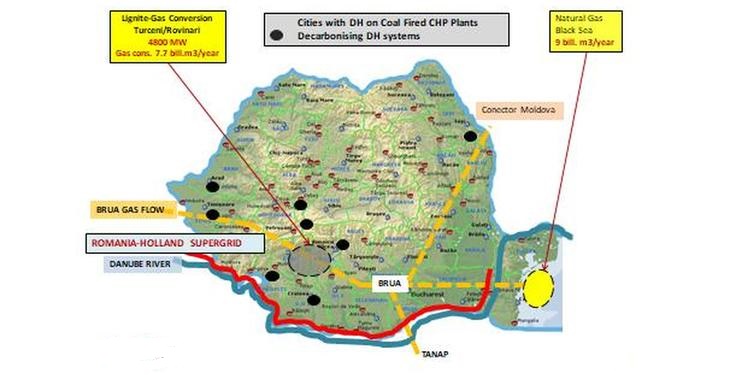The ESCOROM Association of Energy Services Companies in Romania launched in public debate a position paper proposing that the national strategy be based on the most serious energy security issue of the moment: about 3000 MW, mainly generation capacities based on coal (lignite) are expected to exit the system by 2025.
Authors consider that none of the priority projects identified in the current form of the energy strategy (Tarniţa, the coal group in Rovinari, Cernavoda nuclear reactors 3 and 4, Turnu Magurele-Nicopole HPP) is justified in terms of costs vs the contribution to the energy system.
ESCOROM underlines that the vision and objectives of Romania’s energy strategy project should provide an integrated approach of energy security, taking into account the primary resources available, as well as the energy system (electric and thermal, not just electric!), and the need for decarbonisation of the energy system as a whole (not only in the electricity generation sector).
“Romania faces, in the short term, a problem of energy security of maximum gravity,” the authors of the ESCOROM analysis write. “This is related to the fact that, added to the aging of the existing generation park, the lignite power plants at Turceni and Rovinari (but also Işalnița and Mintia) simply cannot meet the EPS standards (emissions below 550 kg of CO2 per MWh) before the 2025 deadline for operating authorization.”
According to the authors, the disappearance of about 3000 MW in generation capacity by 2025 will lead to a major crisis. Given the persistence of the social problem of stopping the production of lignite in the basin of Oltenia, “it is technically and financially impossible to replace about 3000 MW by 2025”, which are the current indispensable thermo capacities, with wind, nuclear, hydro and so on.
The solution proposed by ESCOROM is the “Partial or Total Lignite to Gas Conversion Project” for lignite based thermoelectric power plants, a document that have been submitted to the Ministry of Energy as an opportunity study, according to ESCOROM.
The conversion project is based on the following main elements:
- Exploits the opportunity of BRUA gas pipeline, which is about 8 kilometers away from Turceni (the Bibești compressing station)
- The entire energy infrastructure in the area will continue to be used (330 MW turbines, transformer stations, cooling towers, 400 kV power stations and lines, etc.)
- The current boilers on lignite will be used but at about 50% lower power, by reducing the boiler steam flow. At the same time, a gas turbine of about 440 MW and a recuperator steam boiler will be installed at each group to supply the steam to the existing steam turbine, resulting in a hybrid group of about 770 MW.
Among the identified advantages:
- The exhaustion of gas from the recovery boiler will be made through the same chimney of the existing boiler, so the monitored emissions will be less than 550 Kg CO2 / MWh
- The efficiency of the groups will increase to over 45% for hybrid lignite-gas fuel and over 55% for combined cycle
- The available power per group will increase from 330 MW to about 760 MW and 900 MW combined cycle
- The cost of rehabilitating a group would be less than 400,000 euros per MW, resulting in a very competitive levelized energy cost (LCOE). This cost places this option ahead any other possible investment.
- This solution can be implemented immediately, because no approvals, permits etc. would be needed, if it is treated as a rehabilitation project.
The authors of the study estimate the natural gas consumption per group at around 900 million Nm3 per year, for 8 groups resulting a total of about 7 billion Nm3 per year, quantities that would be mainly secured from Black Sea operations, transiting BRUA. One last important advantage highlighted by the authors is that generation groups using natural gas fueled high-power turbines can provide high flexibility, contributing to enhanced balancing capacity for the national energy system.
According to the official website, ESCOROM brings together six companies (Energy Serv, Servelect, Energo ESCO, Elsaco ESCO, Luxten and E.ON Technical Services) and the Board of Directors includes Carmen Pavel, Cătălin Dragostin and Monica Bucur.
